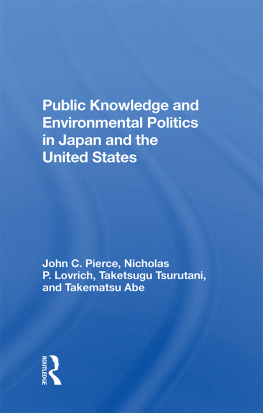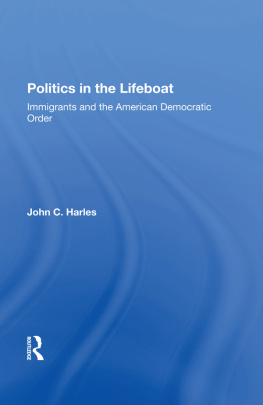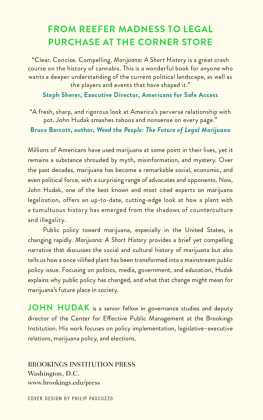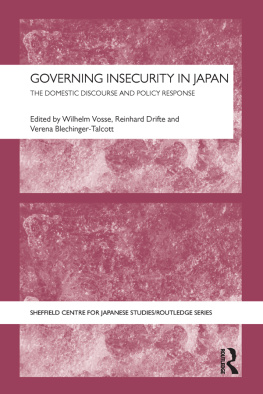Public Knowledge and Environmental Politics in Japan and the United States
Public Knowledge and Environmental Politics in Japan and the United States
John C. Pierce, Nicholas P. Lovrich, Taketsugu Tsurutani, and Takematsu Abe
First published 1989 by Westview Press, Inc.
Published 2019 by Routledge
52 Vanderbilt Avenue, New York, NY 10017
2 Park Square, Milton Park, Abingdon, Oxon OX14 4RN
Routledge is an imprint of the Taylor & Francis Group, an informa business
Copyright 1989 Taylor & Francis
All rights reserved. No part of this book may be reprinted or reproduced or utilised in any form or by any electronic, mechanical, or other means, now known or hereafter invented, including photocopying and recording, or in any information storage or retrieval system, without permission in writing from the publishers.
Notice:
Product or corporate names may be trademarks or registered trademarks, and are used only for identification and explanation without intent to infringe.
Library of Congress Cataloging-in-Publication Data
Public knowledge and environmental politics in Japan and the United
States / by John C. Pierce... [et al.].
p. cm.(Westview special studies in public policy and
public systems management)
ISBN 0-8133-7662-9
1. Environmental policyJapanCitizen participationCase
studies. 2. Environmental policyUnited StatesCitizen
participationCase studies. I. Pierce, John C., 1943 .
II. Series.
HC465.E5P83 1989
363.7'057'0952dc20 89-22528
CIP
ISBN 13: 978-0-367-28470-1 (hbk)
This book grows out of the authors' conviction that as public policy issues become increasingly suffused with scientific and technical content, they correspondingly become more difficult for the citizens of democratic polities to understand. We see a fundamental irony in this development. The postindustrial age giving rise to the profusion of technically and scientifically complex policy issues also has generated increased demands on the part of citizens in democratic nations for public involvement in the formulation of policy in those same issue areas. To us, a critical issue for political scientists is determining the degree to which mass publics have the capacity and the motivation to respond to the challenges posed by the heightened need for policy relevant knowledge in complex issue domains. This book is an attempt to confront that issue and some of its derivative concerns.
We have chosen a cross-national context for the examination of the importance of policy-relevant information in contemporary postindustrial democracies. Such a comparative analysis, in our view, is imperative. It is clear that political cultures differ in how they conceptualize public involvement in the policy process, in how science and technology are treated in politics, and in their norms for access to and the dissemination of policy-relevant information in the political process. We reach a number of conclusions about what aspects of the high complexity/high involvement irony are common to postindustrial democracies and what aspects are nation-specific. The results of the study reported here underscore the importance of cross-national research; our findings indicate clearly that the role of information in citizen responses to environmental policy does depend on whether it occurs in Japan or in the United States. The character of this interaction is, in most respects, consistent with what generally are considered to be the distinctive features of the Japanese and American political cultures.
The first chapter offers several reasons for our decision to examine the issue of public involvement in complex policy areas in the realm of environmental politics. Contemporary environmental issues are both complex and highly sensitive to public demands for citizen participation in policy decisions. Moreover, environmental politics is prototypical of the cross-stratal issues common to the postindustrial age and thus is particularly amenable to cross-national analysis. Of course, other policy areas require similar examination as well. The nature of the policy domain investigated (e.g., science-based as opposed to ideological or class-based concerns) likely structures the way democratic citizenries respond to the need for information facing them as they seek to participate in political decisions. It is our hope that the critical issues raised in this book on the environmental policy domain will also be examined in other policy areas. Such comparative public policy research will add importantly to our knowledge about how the high complexity/high participation irony of postindustrial politics is likely to play itself out in contemporary democratic polities.
Reflecting a desire to write for a somewhat broad audience, we have in many cases avoided the use of the more unfamiliar statistical analyses and omitted the often detailed account of measurement validation, survey documentation and similar important-though exceedingly tedious-technical material. For the particularly curious reader most of this type of analysis and detailed background information is available in one or more of the several primary articles published in professional journals. In particular, the following would be of special interest in this regard: '"Knowledge Gap' Phenomena..." Communications Research (1984); "Water Pollution Control in Democratic Societies..." Policy Studies Review (1985); "Policy-Relevant Information and Public Attitudes..." Water Resources Bulletin (1986); "Vanguards and Rearguards in Environmental Politics..." Comparative Political Studies (1986); and "Culture, Politics and Mass Publics..." Journal of Politics (1986).
John C. Pierce
Nicholas P. Lovrich
Taketsugu Tsurutani
Takematsu Abe
The authors of any book such as this incur numerous debts. We are no exception in this regard, for we owe much to an extraordinary number of people and institutions. Limitations of space preclude a complete listing of acknowledgments, but the following parties were particularly crucial to the completion of this work.
Funds for the research reported here were provided by the Japan/U.S. Friendship Commission in the form of a grant to Lovrich and Abe administered by the Institute for International Education. The Ohta Foundation (Tokyo) provided extensive support to the entire project, including a visiting professorship to Pierce at Nihon University. Nihon University and Washington State University both provided facilities and staff assistance to all members of the research team. While these institutions made it possible for us to conduct our research (for which we are enormously grateful), they bear no responsibility for the contents of the book and should not be blamed for errors of omission or commission.
A number of individuals assisted us in both our Washington and Japanese settings. At this point, the most we can do is list their names, but they should know that our gratitude goes much deeper than that simple enumeration. In Washington State Morey Haggin, Steve Hasson, Margaret Portman and Bill Gray were all essential to the success of our research in Spokane. At Nihon University and in Shizuoka Prefecture Kenji Yamamoto, Masayuki Akiyama, Tsukasa Nishida and Katherine Lovrich were essential to making our research project possible.
There is one person to whom we wish to give particular acknowledgment. Ruth Self, who has had the responsibility for preparing the final manuscript for publication, deserves special recognition. It has been a complex and complicated task inherited from Cynthia Avery as part of a new job. She has handled this enormous task with grace and competence. We promise not to put her through the same protracted torture in the near future.










